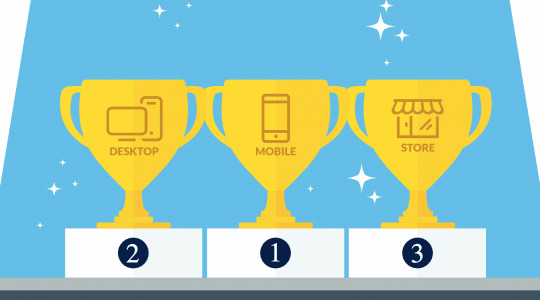
Mobile marketing is all about giving the user the smoothest, personalized experience they can have. Happy customers means less uninstalls, more conversions, more time spent in the app, and more trust built. With the added context of location you’ll instantly level-up your mobile marketing strategy.
Location-based marketing matters
Simply put, location data gives marketers the ability to personalize the message they send a user based on where that user currently is or the places they have visited. Using location can help drive brick and mortar store visits, increase app engagement at the right place and time or open up additional insight into user profiles.
Everyone knows the classic example where a user receives an offer notification as they pass a brick and mortar store, but today’s good proximity can be so much more. For example rather than just blindly engaging the user when they are near the store, the retailer could combine the customer’s purchase history along with current environmental conditions to create a highly personalized engagement just for them, such as advertising allergy medicine to those most affected when pollen counts are high.
For marketers of apps without obvious real-world components, there’s a huge opportunity to keep users engaged with their app. For example, a video streaming service could identify when users are likely at home and provide notifications for recommended content when they are most likely to engage with the app.
Finally, all apps can create rich, actionable audience segments based on the real world places their users visit. For example, you can easily segment out your sports fanatics based on those users that have visited the local stadium once in the last 60 days or movie buffs based on visits to the local theater.
3 ways to create the best experience
CJ Chaney, co-founder of Smartwhere, a proximity platform company that powers TUNE’s location services, offers his top advice for those breaking into location-based marketing.
- Don’t be creepy. Yes, we know in today’s world it’s possible to get way too much information about the user, especially with location in the mix, but resist the temptation. A critical component of good marketing, and especially location based marketing, is building trust. Not being creepy when it comes to location-based marketing means being transparent about how you are collecting location information and with whom you are sharing it. A user should never ask themselves “How did they know that?” or “Who else is this information being shared with?” With location, there should never be any surprises.
- Provide value. In addition to not being creepy, make the reciprocal value of location sharing obvious to the user. Unlock an exclusive in-store mode experience with the perfect information and features they need while on site. Create personalized deals and valuable product recommendations knowing the categories of places that they frequently visit, like golf courses, spas or high end restaurants.
- Don’t over message. Have a friend who shares way too much information, way too often? Sometimes it’s easier to cut them off altogether instead of addressing them every time. In the app world that’s equivalent to an uninstall. If a coffee shop pinged you to stop in every time you walked by, that would get pretty annoying. Marketers can easily overdo their messaging cadence in the same way and the effect is only magnified when using location. Choose your time and place wisely. Sometimes, the best time to message the user can even be after the visit, for example with a follow up survey or after a visit to a competitor.
“If there is one thing we’ve learned doing location and proximity for 6+ years it’s that there can be too much of a good thing. Location based engagement is highly effective in terms of user response, but the marketer needs to be hyper aware of context to maximize return. Asking the user if they’re interested in the same offer each time they enter a location is begging to have notifications turned off or your app uninstalled.” — CJ Chaney, co-founder, Smartwhere
Give location-based marketing a try
Location-based marketing is a powerful tool, and when marketers get it right, they reap the benefits with their customers. It works best when paired with in-app marketing and attribution data. Want to know more? Try TUNE’s Attribution Analytics product for free.
Author
Becky is the Senior Content Marketing Manager at TUNE. Before TUNE, she led a variety of marketing and communications projects at San Francisco startups. Becky received her bachelor's degree in English from Wake Forest University. After living nearly a decade in San Francisco and Seattle, she has returned to her home of Charleston, SC, where you can find her enjoying the sun and salt water with her family.




Leave a Reply
You must be logged in to post a comment.